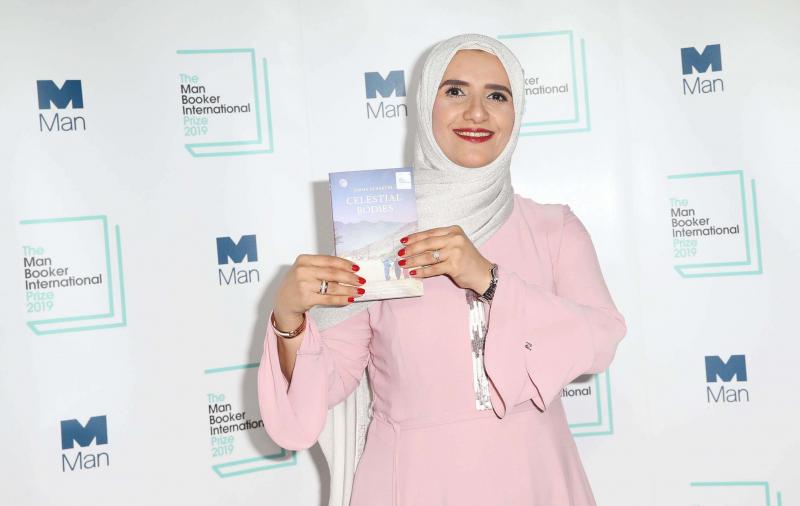Oman’s story shows Arab writers are finding their voice

Extraordinary talent. Omani author Jokha al-Harthi poses after winning the Man Booker International Prize in London, May 21. (AFP)
The way Harthi tells the story, Oman comes sharply into focus as a distinctive place and its people acquire a distinct personality.
How much does the world really know about Oman and what does it know about Arabs? Little or nothing about Oman. Of Arabs, it is mostly based on stories told about them by others.
This may be changing as Arab storytellers find their voice. One of these is Jokha al-Harthi, whose book “Celestial Bodies” won the Man Booker International Prize for Literature. It’s the first novel translated from Arabic to win the award. Harthi is the first Omani woman to have a novel translated into English and “Celestial Bodies” may be the first time an Anglophone reader engaged with Oman on its own terms.
Truly, as Harthi said after she won the prize: “A window has been opened.” She suggested readers will get to see “the rich Arabic culture” but it is the novel’s specificity that makes it unique. It vividly paints a picture of Oman and its people, the struggles against the British, the battle for modernity without making war on tradition.
In telling the story of Oman, which is as much a character as the three sisters around whom the book revolves, Harthi smashed a stereotype even as she built a bridge. Those who know nothing of Oman — or, for that matter, of Arabs — will cleave to this account of three generations, a changing society and of love and loss.
They will find characters familiar from other stories about other places, as well as from life elsewhere. They will recognise the young mother and her stubborn insistence on an unusual name — London — for the new baby; the female doctor London who married in haste for love and repented at leisure; the youngest and prettiest sister’s decision to divorce her neglectful husband after a decade of marriage.
There are other familiar characters, albeit distinctly Omani — the capable female Bedouin entrepreneur who refuses to marry and elects to live as she pleases, the female slave who continues to be loyal to her master even though slavery has long since been outlawed in the country.
The way Harthi tells the story, Oman comes sharply into focus as a distinctive place and its people acquire a distinct personality.
What this book by a small Scottish publisher shows is the storyteller’s unique power and ability to transmit a cultural identity. Coming from a rich, if sadly recently less observed tradition of storytelling, Arab writers could prove to be a positive force for change of the world’s perception of a whole people. In the fictional daily rhythms of life in a changing Oman — new cities, fast-food, fast cars, modern schools, women’s education, migration to Dubai and to Canada — the world can see a reassuring reflection of itself and of real people living real lives in an Arab country.
This is significant when stereotypes across literature, film and television routinely link Islam and Arabs with holy war and terrorism. As the late Jack G. Shaheen, author of “Reel Bad Arabs” and other books on racial and ethnic stereotyping once said, hundreds of Hollywood films in the last 50 years have depicted Muslims as either “hostile alien intruders” or “lecherous, oily sheikhs intent on using nuclear weapons.”
It will take more than one prize-winning novel set in Oman to change that but there is a growing sense of more Arab writers determinedly taking charge of the narrative and telling their stories and that of their communities to far-flung audiences.
In his 1978 book “Orientalism,” Edward Said argued that Western cultures historically stereotyped the Middle East and its peoples and cultures to justify control over it. There was the old trope of the exotic region — a homogenous place seemingly filled with magnificent palaces and flying carpets, as well as scenes straight out of “One Thousand and One Nights.” There is also the more recent terrorist trope.
Neither is true and Arabs themselves are beginning to tell the real story.
The world is beginning to listen.
Originally published in The Arab Weekly

